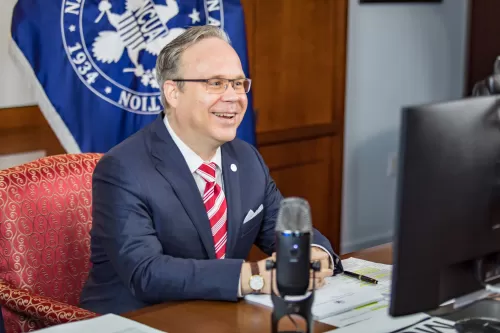NCUA Chairman Todd M. Harper at the agency's Headquarters in Alexandria, Virginia.
As Prepared for Delivery on December 8, 2021
As we begin today’s public hearing, I want to thank Eugene Scheid and the entire team in the Office of the Chief Financial Officer as well as the Office of the Executive Director for their diligent efforts in preparing the NCUA staff draft budget for 2022 and 2023. And, I am also very appreciative of my fellow Board members’ willingness to engage with me on their budget priorities.
While considerable work went into crafting the staff draft budget, this document is only our starting point for discussions and not a final product. That is why it is important for the NCUA Board to receive stakeholder input from today’s witnesses as well as through written comments. As a reminder, those written comments are due tomorrow — Thursday, December 9th. I encourage everyone with an interest in maintaining a safe and sound credit union system, with strong consumer protections, to weigh-in.
As I have often said, a budget is a forward-looking document that establishes priorities. My budget priorities have always included appropriate resources for an effective cybersecurity program, a strong consumer financial protection and fair lending program, sufficient small credit union support, and ample resources for an effective examination and supervision program.
And, 21 months into the COVID-19 pandemic, the NCUA remains focused on keeping its employees and contractors safe, so that we can continue to perform mission-essential functions. We have also pragmatically and expeditiously addressed the economic fallout within the credit union system by providing appropriate regulatory flexibility, and we will continue to do so. Credit union members are counting on us, as are the taxpayers who back the Share Insurance Fund, to get it right.
On cybersecurity, I remain deeply focused on the risks that cyber-attacks pose to our financial system. As has been noted at previous Board meetings, the COVID-19 pandemic has increased cybersecurity exposures for all, including federally insured credit unions. To that end, the NCUA is committed to maintaining the resilience and readiness of the credit union system in responding to evolving cybersecurity risks. We will continue to mature and strengthen our cybersecurity program.
And, we have known for decades that the NCUA has maintained too light of a touch in overseeing consumer financial protection and fair lending. There is a real need for us to strengthen our commitment in this area.
For example, we conduct just 30 fair lending exams each year. That accounts for less than one percent of credit unions. Yet, we have identified tens of thousands of credit union members who have been subjected to unfair practices in the last year alone. I remain deeply committed to strengthening the NCUA consumer compliance and fair lending programs to ensure that all consumers receive the same level of protection regardless of their financial provider of choice.
Additionally, small, low-income, and minority credit unions are vital to the continued health of the credit union system and are often the only providers of safe, fair, and affordable financial services in communities of color, underserved areas, and rural communities. Yet, these credit unions are challenged by their lack of adequate resources. The pandemic has only exasperated this situation. The NCUA can do its part by supporting these credit unions through grants, loans, training, and greater technical assistance.
Finally, we must remain vigilant when it comes to safety and soundness. With the expiration of pandemic-relief programs, more households will come under financial stress next year. And, that stress can lead to credit defaults at credit unions. To best protect the system and the Share Insurance Fund, we ought to maintain at least the current exam program, which allows for extended exams at well-run credit unions with less than $1 billion in assets.
In conclusion, when considering this budget, I am committed to doing what is right for credit union members, the agency and its employees, the Share Insurance Fund, and the credit union system. I also know that if we take the time and work together, we can identify a mutually agreeable budget that addresses everyone’s shared priorities.
In fact, there is a fair amount of common ground between the Board offices, and I look forward to working with my fellow Board members to produce a consensus budget for the year ahead.
That concludes my opening remarks. Vice Chairman Hauptman?



